A psychotherapy viewpoint on cognitive – behavioural perspective and personality
VerifiedAdded on 2022/12/22
|8
|1760
|20
AI Summary
This article discusses the cognitive-behavioural perspective on personality and its impact on psychotherapy. It explores how external and internal factors contribute to the development of personality disorders. The article also highlights the applications of cognitive behavioural therapy (CBT) in treating personality and related disorders.
Contribute Materials
Your contribution can guide someone’s learning journey. Share your
documents today.
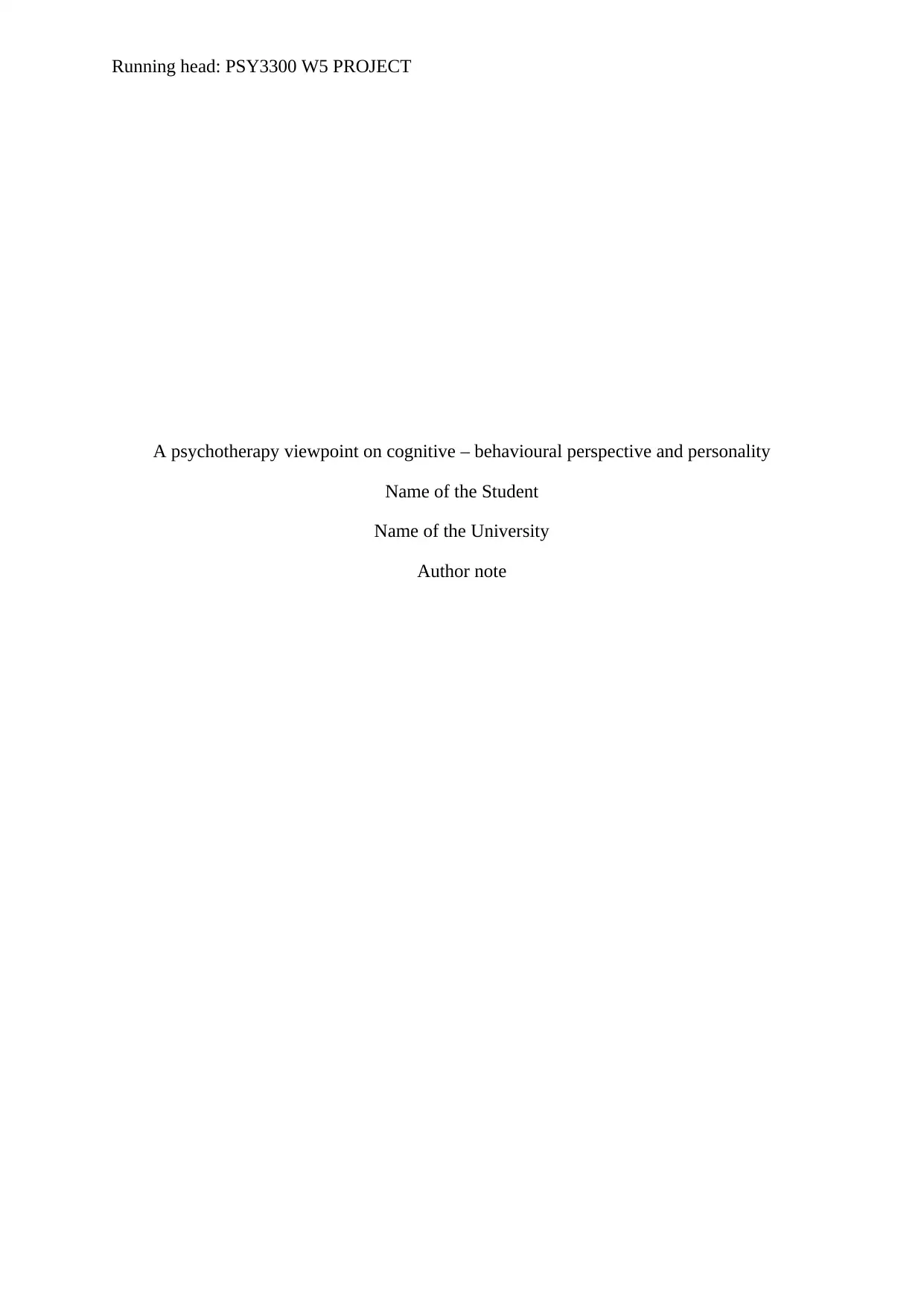
Running head: PSY3300 W5 PROJECT
A psychotherapy viewpoint on cognitive – behavioural perspective and personality
Name of the Student
Name of the University
Author note
A psychotherapy viewpoint on cognitive – behavioural perspective and personality
Name of the Student
Name of the University
Author note
Secure Best Marks with AI Grader
Need help grading? Try our AI Grader for instant feedback on your assignments.
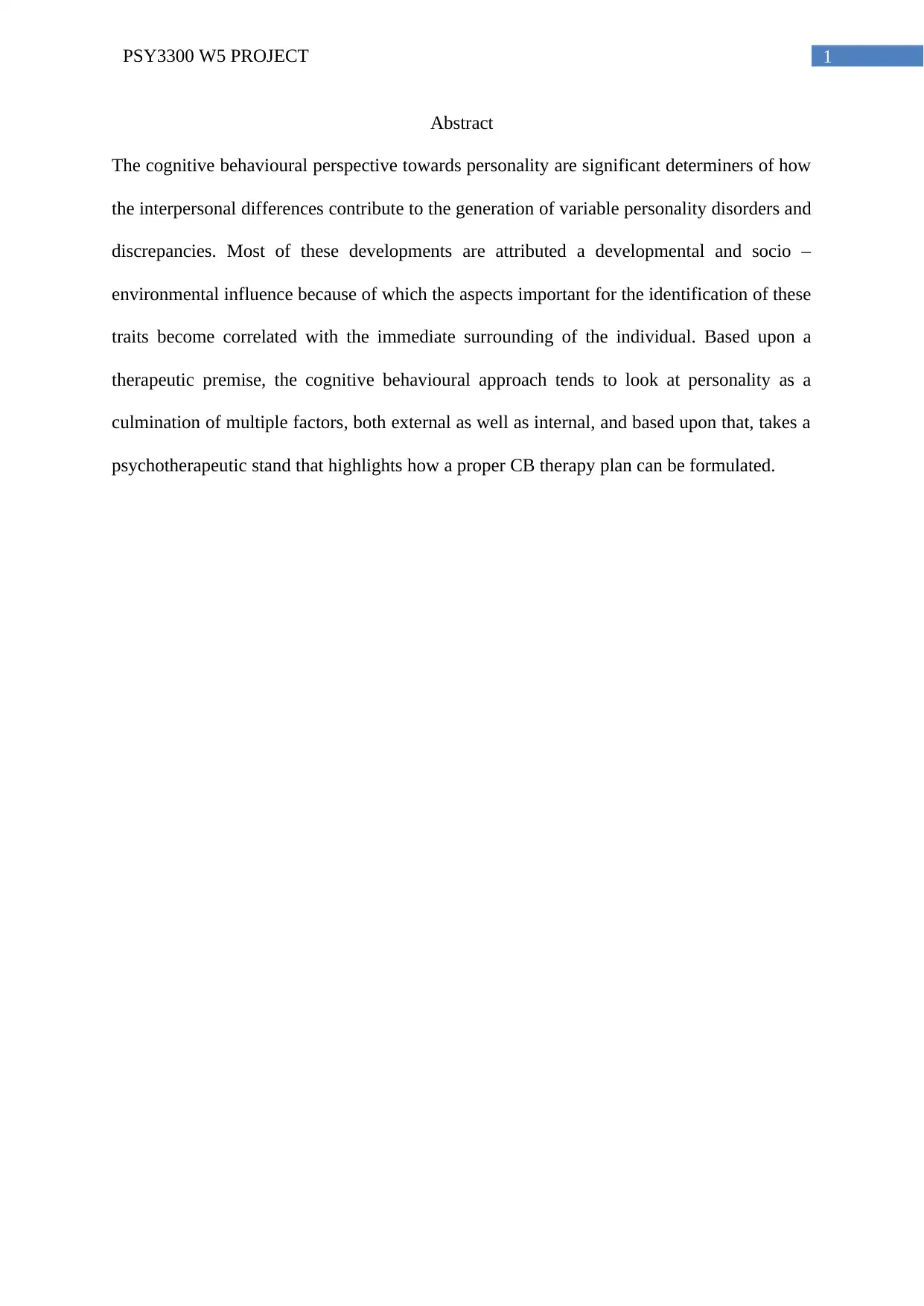
1PSY3300 W5 PROJECT
Abstract
The cognitive behavioural perspective towards personality are significant determiners of how
the interpersonal differences contribute to the generation of variable personality disorders and
discrepancies. Most of these developments are attributed a developmental and socio –
environmental influence because of which the aspects important for the identification of these
traits become correlated with the immediate surrounding of the individual. Based upon a
therapeutic premise, the cognitive behavioural approach tends to look at personality as a
culmination of multiple factors, both external as well as internal, and based upon that, takes a
psychotherapeutic stand that highlights how a proper CB therapy plan can be formulated.
Abstract
The cognitive behavioural perspective towards personality are significant determiners of how
the interpersonal differences contribute to the generation of variable personality disorders and
discrepancies. Most of these developments are attributed a developmental and socio –
environmental influence because of which the aspects important for the identification of these
traits become correlated with the immediate surrounding of the individual. Based upon a
therapeutic premise, the cognitive behavioural approach tends to look at personality as a
culmination of multiple factors, both external as well as internal, and based upon that, takes a
psychotherapeutic stand that highlights how a proper CB therapy plan can be formulated.
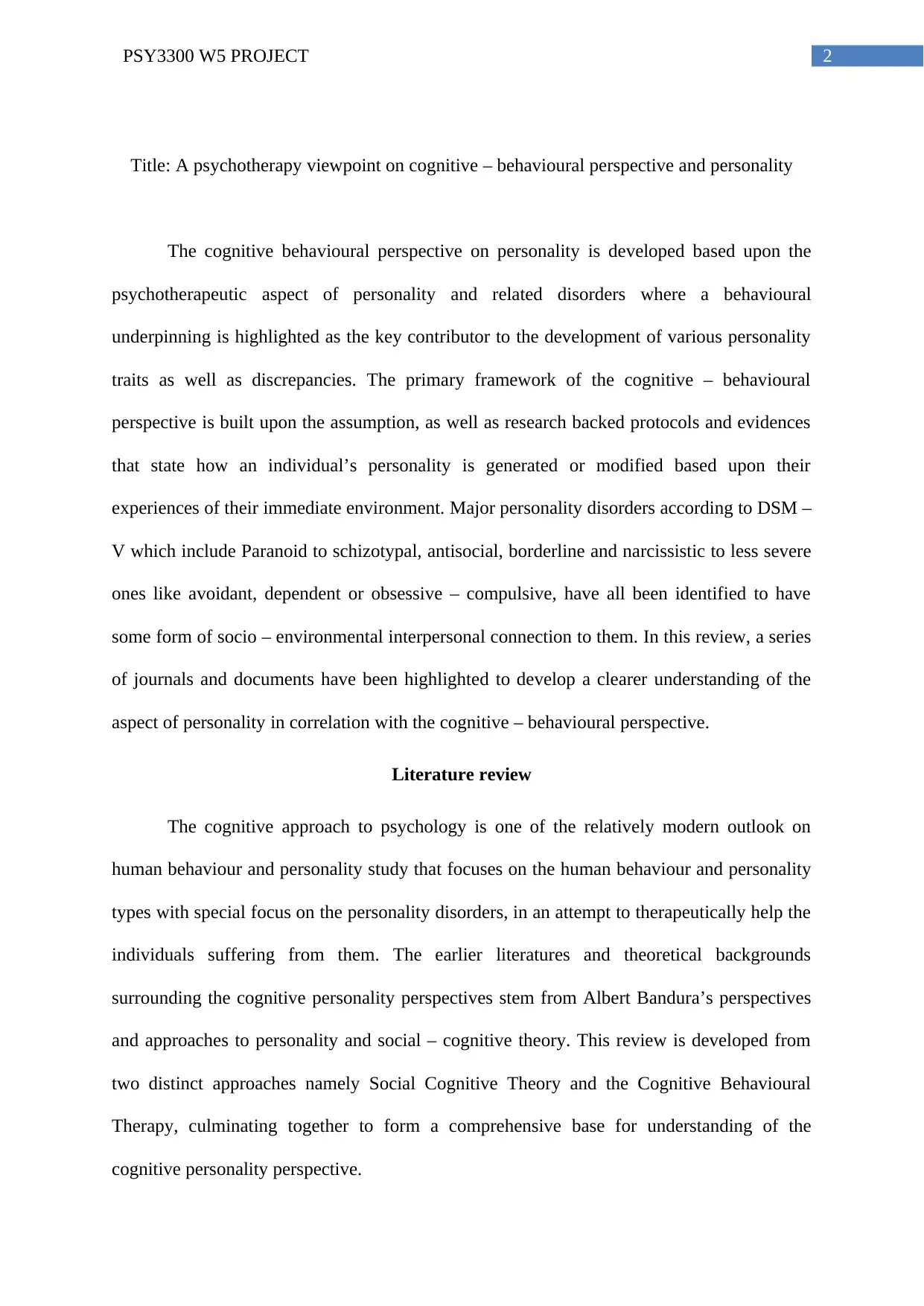
2PSY3300 W5 PROJECT
Title: A psychotherapy viewpoint on cognitive – behavioural perspective and personality
The cognitive behavioural perspective on personality is developed based upon the
psychotherapeutic aspect of personality and related disorders where a behavioural
underpinning is highlighted as the key contributor to the development of various personality
traits as well as discrepancies. The primary framework of the cognitive – behavioural
perspective is built upon the assumption, as well as research backed protocols and evidences
that state how an individual’s personality is generated or modified based upon their
experiences of their immediate environment. Major personality disorders according to DSM –
V which include Paranoid to schizotypal, antisocial, borderline and narcissistic to less severe
ones like avoidant, dependent or obsessive – compulsive, have all been identified to have
some form of socio – environmental interpersonal connection to them. In this review, a series
of journals and documents have been highlighted to develop a clearer understanding of the
aspect of personality in correlation with the cognitive – behavioural perspective.
Literature review
The cognitive approach to psychology is one of the relatively modern outlook on
human behaviour and personality study that focuses on the human behaviour and personality
types with special focus on the personality disorders, in an attempt to therapeutically help the
individuals suffering from them. The earlier literatures and theoretical backgrounds
surrounding the cognitive personality perspectives stem from Albert Bandura’s perspectives
and approaches to personality and social – cognitive theory. This review is developed from
two distinct approaches namely Social Cognitive Theory and the Cognitive Behavioural
Therapy, culminating together to form a comprehensive base for understanding of the
cognitive personality perspective.
Title: A psychotherapy viewpoint on cognitive – behavioural perspective and personality
The cognitive behavioural perspective on personality is developed based upon the
psychotherapeutic aspect of personality and related disorders where a behavioural
underpinning is highlighted as the key contributor to the development of various personality
traits as well as discrepancies. The primary framework of the cognitive – behavioural
perspective is built upon the assumption, as well as research backed protocols and evidences
that state how an individual’s personality is generated or modified based upon their
experiences of their immediate environment. Major personality disorders according to DSM –
V which include Paranoid to schizotypal, antisocial, borderline and narcissistic to less severe
ones like avoidant, dependent or obsessive – compulsive, have all been identified to have
some form of socio – environmental interpersonal connection to them. In this review, a series
of journals and documents have been highlighted to develop a clearer understanding of the
aspect of personality in correlation with the cognitive – behavioural perspective.
Literature review
The cognitive approach to psychology is one of the relatively modern outlook on
human behaviour and personality study that focuses on the human behaviour and personality
types with special focus on the personality disorders, in an attempt to therapeutically help the
individuals suffering from them. The earlier literatures and theoretical backgrounds
surrounding the cognitive personality perspectives stem from Albert Bandura’s perspectives
and approaches to personality and social – cognitive theory. This review is developed from
two distinct approaches namely Social Cognitive Theory and the Cognitive Behavioural
Therapy, culminating together to form a comprehensive base for understanding of the
cognitive personality perspective.
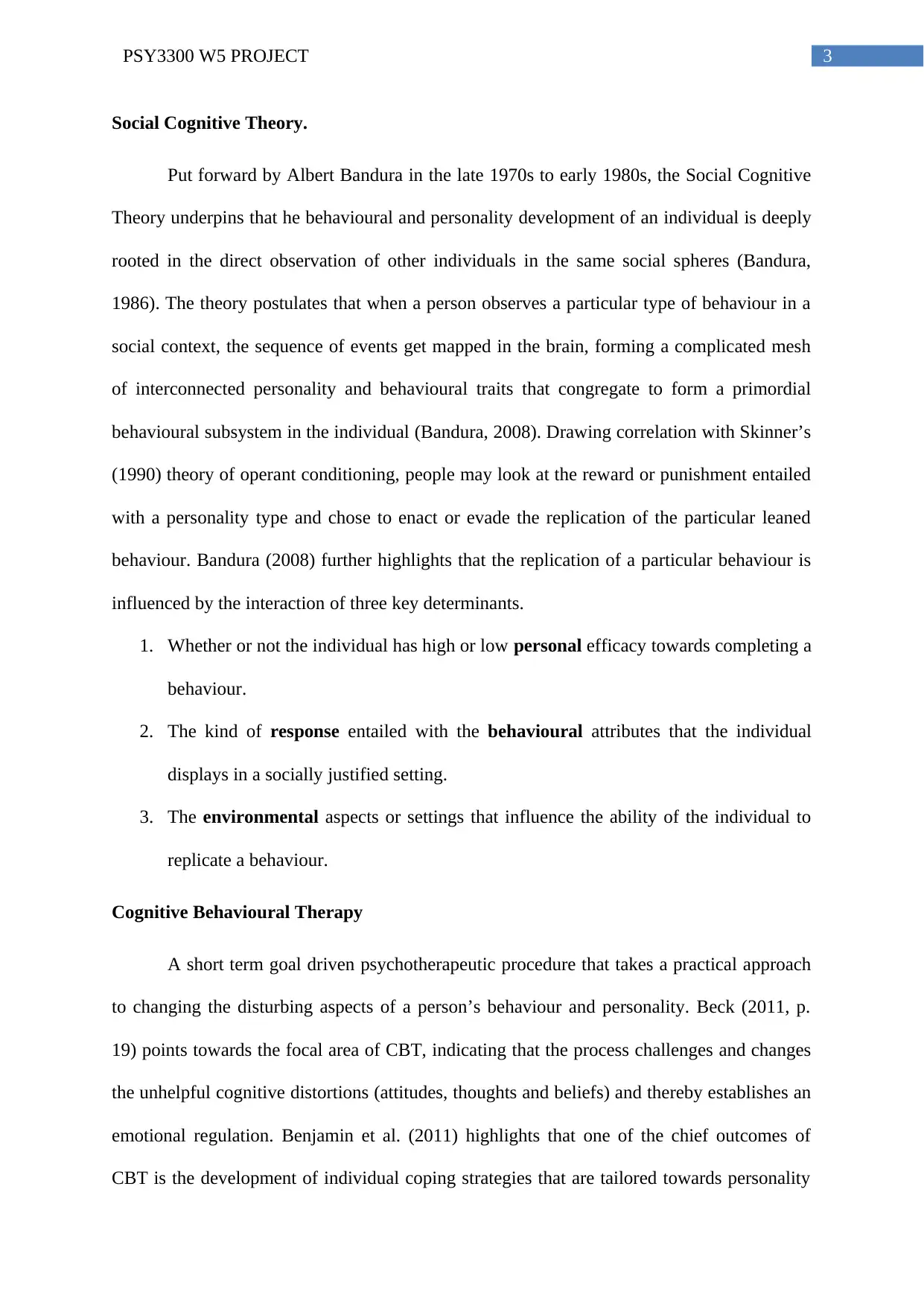
3PSY3300 W5 PROJECT
Social Cognitive Theory.
Put forward by Albert Bandura in the late 1970s to early 1980s, the Social Cognitive
Theory underpins that he behavioural and personality development of an individual is deeply
rooted in the direct observation of other individuals in the same social spheres (Bandura,
1986). The theory postulates that when a person observes a particular type of behaviour in a
social context, the sequence of events get mapped in the brain, forming a complicated mesh
of interconnected personality and behavioural traits that congregate to form a primordial
behavioural subsystem in the individual (Bandura, 2008). Drawing correlation with Skinner’s
(1990) theory of operant conditioning, people may look at the reward or punishment entailed
with a personality type and chose to enact or evade the replication of the particular leaned
behaviour. Bandura (2008) further highlights that the replication of a particular behaviour is
influenced by the interaction of three key determinants.
1. Whether or not the individual has high or low personal efficacy towards completing a
behaviour.
2. The kind of response entailed with the behavioural attributes that the individual
displays in a socially justified setting.
3. The environmental aspects or settings that influence the ability of the individual to
replicate a behaviour.
Cognitive Behavioural Therapy
A short term goal driven psychotherapeutic procedure that takes a practical approach
to changing the disturbing aspects of a person’s behaviour and personality. Beck (2011, p.
19) points towards the focal area of CBT, indicating that the process challenges and changes
the unhelpful cognitive distortions (attitudes, thoughts and beliefs) and thereby establishes an
emotional regulation. Benjamin et al. (2011) highlights that one of the chief outcomes of
CBT is the development of individual coping strategies that are tailored towards personality
Social Cognitive Theory.
Put forward by Albert Bandura in the late 1970s to early 1980s, the Social Cognitive
Theory underpins that he behavioural and personality development of an individual is deeply
rooted in the direct observation of other individuals in the same social spheres (Bandura,
1986). The theory postulates that when a person observes a particular type of behaviour in a
social context, the sequence of events get mapped in the brain, forming a complicated mesh
of interconnected personality and behavioural traits that congregate to form a primordial
behavioural subsystem in the individual (Bandura, 2008). Drawing correlation with Skinner’s
(1990) theory of operant conditioning, people may look at the reward or punishment entailed
with a personality type and chose to enact or evade the replication of the particular leaned
behaviour. Bandura (2008) further highlights that the replication of a particular behaviour is
influenced by the interaction of three key determinants.
1. Whether or not the individual has high or low personal efficacy towards completing a
behaviour.
2. The kind of response entailed with the behavioural attributes that the individual
displays in a socially justified setting.
3. The environmental aspects or settings that influence the ability of the individual to
replicate a behaviour.
Cognitive Behavioural Therapy
A short term goal driven psychotherapeutic procedure that takes a practical approach
to changing the disturbing aspects of a person’s behaviour and personality. Beck (2011, p.
19) points towards the focal area of CBT, indicating that the process challenges and changes
the unhelpful cognitive distortions (attitudes, thoughts and beliefs) and thereby establishes an
emotional regulation. Benjamin et al. (2011) highlights that one of the chief outcomes of
CBT is the development of individual coping strategies that are tailored towards personality
Secure Best Marks with AI Grader
Need help grading? Try our AI Grader for instant feedback on your assignments.
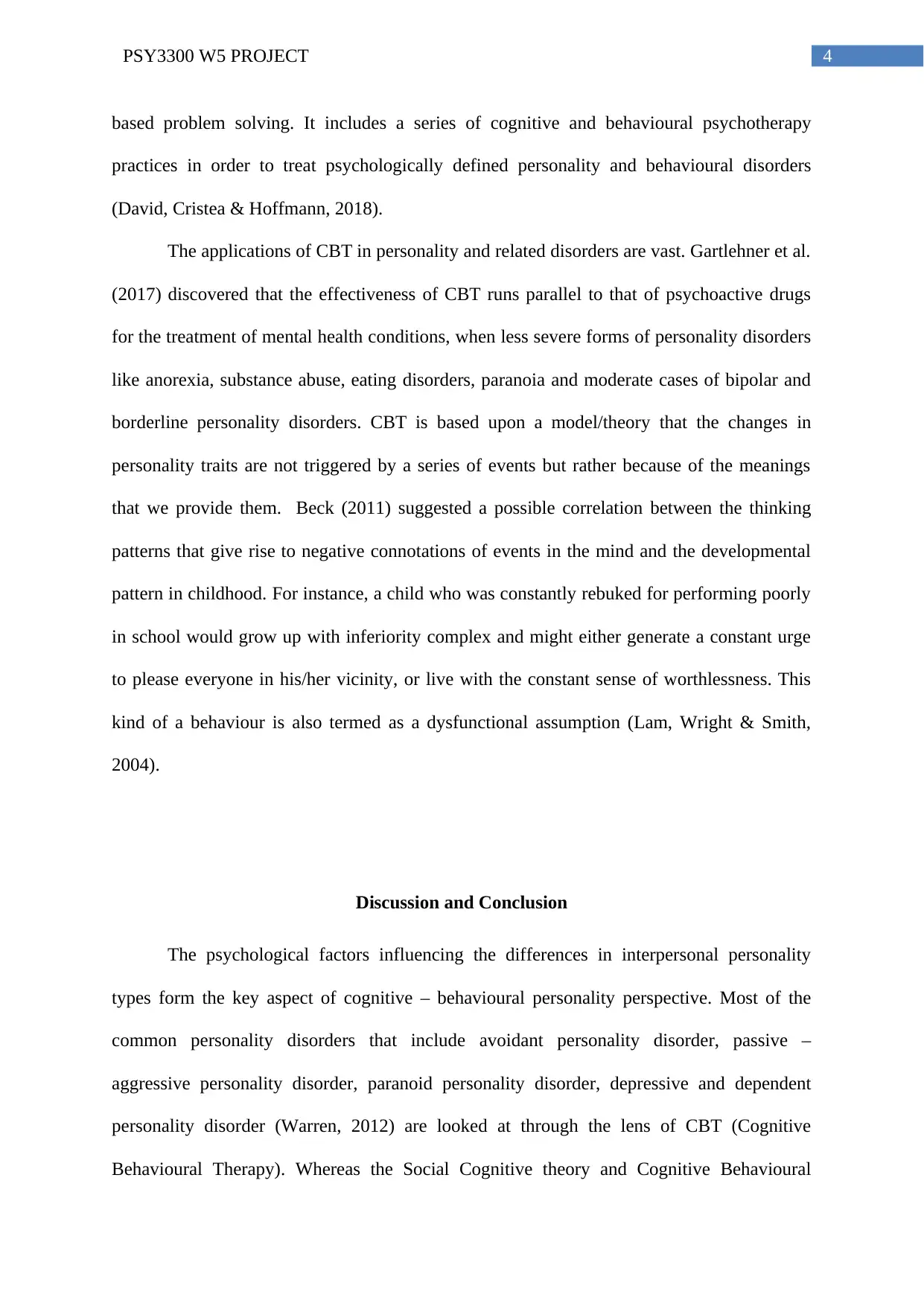
4PSY3300 W5 PROJECT
based problem solving. It includes a series of cognitive and behavioural psychotherapy
practices in order to treat psychologically defined personality and behavioural disorders
(David, Cristea & Hoffmann, 2018).
The applications of CBT in personality and related disorders are vast. Gartlehner et al.
(2017) discovered that the effectiveness of CBT runs parallel to that of psychoactive drugs
for the treatment of mental health conditions, when less severe forms of personality disorders
like anorexia, substance abuse, eating disorders, paranoia and moderate cases of bipolar and
borderline personality disorders. CBT is based upon a model/theory that the changes in
personality traits are not triggered by a series of events but rather because of the meanings
that we provide them. Beck (2011) suggested a possible correlation between the thinking
patterns that give rise to negative connotations of events in the mind and the developmental
pattern in childhood. For instance, a child who was constantly rebuked for performing poorly
in school would grow up with inferiority complex and might either generate a constant urge
to please everyone in his/her vicinity, or live with the constant sense of worthlessness. This
kind of a behaviour is also termed as a dysfunctional assumption (Lam, Wright & Smith,
2004).
Discussion and Conclusion
The psychological factors influencing the differences in interpersonal personality
types form the key aspect of cognitive – behavioural personality perspective. Most of the
common personality disorders that include avoidant personality disorder, passive –
aggressive personality disorder, paranoid personality disorder, depressive and dependent
personality disorder (Warren, 2012) are looked at through the lens of CBT (Cognitive
Behavioural Therapy). Whereas the Social Cognitive theory and Cognitive Behavioural
based problem solving. It includes a series of cognitive and behavioural psychotherapy
practices in order to treat psychologically defined personality and behavioural disorders
(David, Cristea & Hoffmann, 2018).
The applications of CBT in personality and related disorders are vast. Gartlehner et al.
(2017) discovered that the effectiveness of CBT runs parallel to that of psychoactive drugs
for the treatment of mental health conditions, when less severe forms of personality disorders
like anorexia, substance abuse, eating disorders, paranoia and moderate cases of bipolar and
borderline personality disorders. CBT is based upon a model/theory that the changes in
personality traits are not triggered by a series of events but rather because of the meanings
that we provide them. Beck (2011) suggested a possible correlation between the thinking
patterns that give rise to negative connotations of events in the mind and the developmental
pattern in childhood. For instance, a child who was constantly rebuked for performing poorly
in school would grow up with inferiority complex and might either generate a constant urge
to please everyone in his/her vicinity, or live with the constant sense of worthlessness. This
kind of a behaviour is also termed as a dysfunctional assumption (Lam, Wright & Smith,
2004).
Discussion and Conclusion
The psychological factors influencing the differences in interpersonal personality
types form the key aspect of cognitive – behavioural personality perspective. Most of the
common personality disorders that include avoidant personality disorder, passive –
aggressive personality disorder, paranoid personality disorder, depressive and dependent
personality disorder (Warren, 2012) are looked at through the lens of CBT (Cognitive
Behavioural Therapy). Whereas the Social Cognitive theory and Cognitive Behavioural
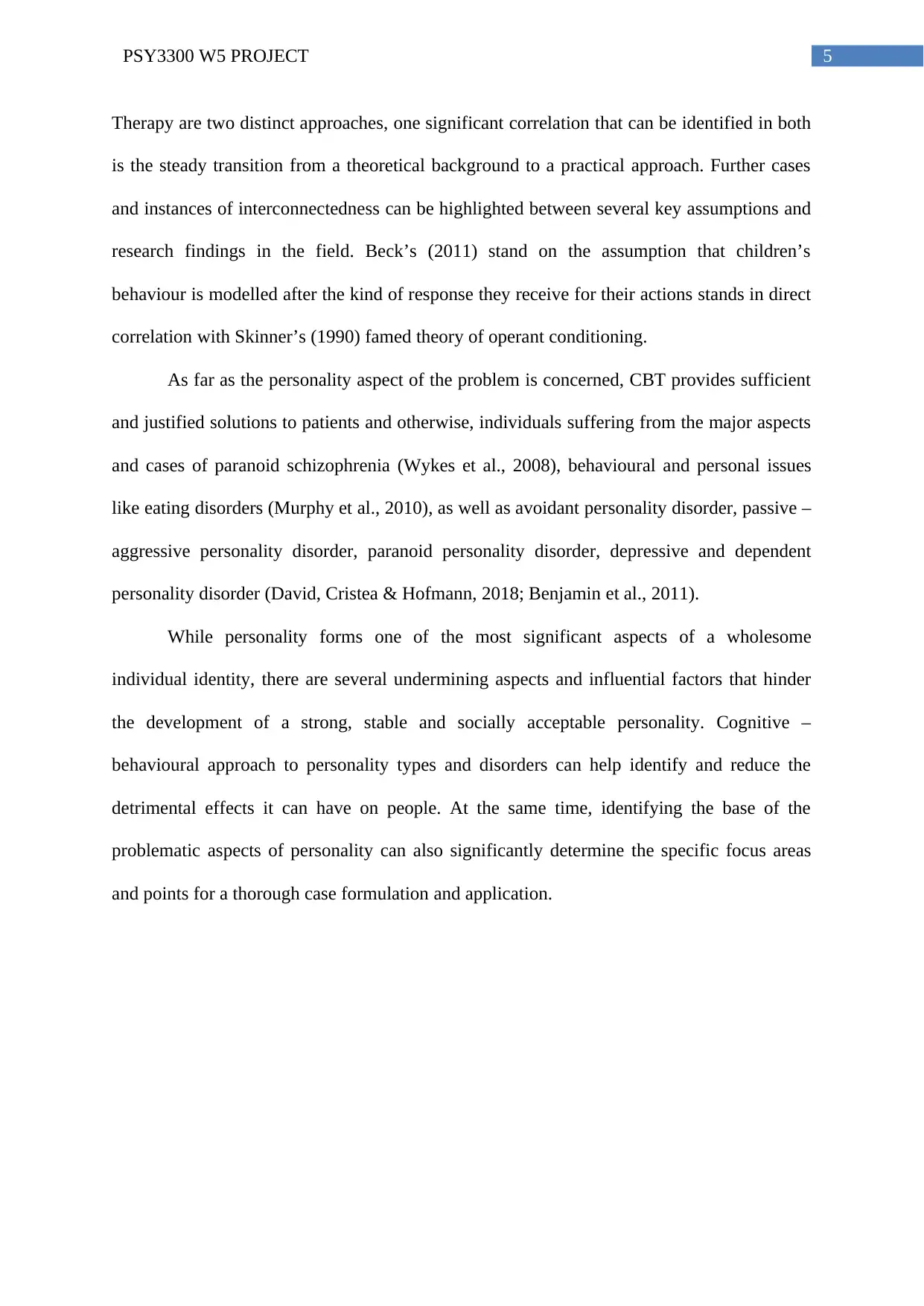
5PSY3300 W5 PROJECT
Therapy are two distinct approaches, one significant correlation that can be identified in both
is the steady transition from a theoretical background to a practical approach. Further cases
and instances of interconnectedness can be highlighted between several key assumptions and
research findings in the field. Beck’s (2011) stand on the assumption that children’s
behaviour is modelled after the kind of response they receive for their actions stands in direct
correlation with Skinner’s (1990) famed theory of operant conditioning.
As far as the personality aspect of the problem is concerned, CBT provides sufficient
and justified solutions to patients and otherwise, individuals suffering from the major aspects
and cases of paranoid schizophrenia (Wykes et al., 2008), behavioural and personal issues
like eating disorders (Murphy et al., 2010), as well as avoidant personality disorder, passive –
aggressive personality disorder, paranoid personality disorder, depressive and dependent
personality disorder (David, Cristea & Hofmann, 2018; Benjamin et al., 2011).
While personality forms one of the most significant aspects of a wholesome
individual identity, there are several undermining aspects and influential factors that hinder
the development of a strong, stable and socially acceptable personality. Cognitive –
behavioural approach to personality types and disorders can help identify and reduce the
detrimental effects it can have on people. At the same time, identifying the base of the
problematic aspects of personality can also significantly determine the specific focus areas
and points for a thorough case formulation and application.
Therapy are two distinct approaches, one significant correlation that can be identified in both
is the steady transition from a theoretical background to a practical approach. Further cases
and instances of interconnectedness can be highlighted between several key assumptions and
research findings in the field. Beck’s (2011) stand on the assumption that children’s
behaviour is modelled after the kind of response they receive for their actions stands in direct
correlation with Skinner’s (1990) famed theory of operant conditioning.
As far as the personality aspect of the problem is concerned, CBT provides sufficient
and justified solutions to patients and otherwise, individuals suffering from the major aspects
and cases of paranoid schizophrenia (Wykes et al., 2008), behavioural and personal issues
like eating disorders (Murphy et al., 2010), as well as avoidant personality disorder, passive –
aggressive personality disorder, paranoid personality disorder, depressive and dependent
personality disorder (David, Cristea & Hofmann, 2018; Benjamin et al., 2011).
While personality forms one of the most significant aspects of a wholesome
individual identity, there are several undermining aspects and influential factors that hinder
the development of a strong, stable and socially acceptable personality. Cognitive –
behavioural approach to personality types and disorders can help identify and reduce the
detrimental effects it can have on people. At the same time, identifying the base of the
problematic aspects of personality can also significantly determine the specific focus areas
and points for a thorough case formulation and application.
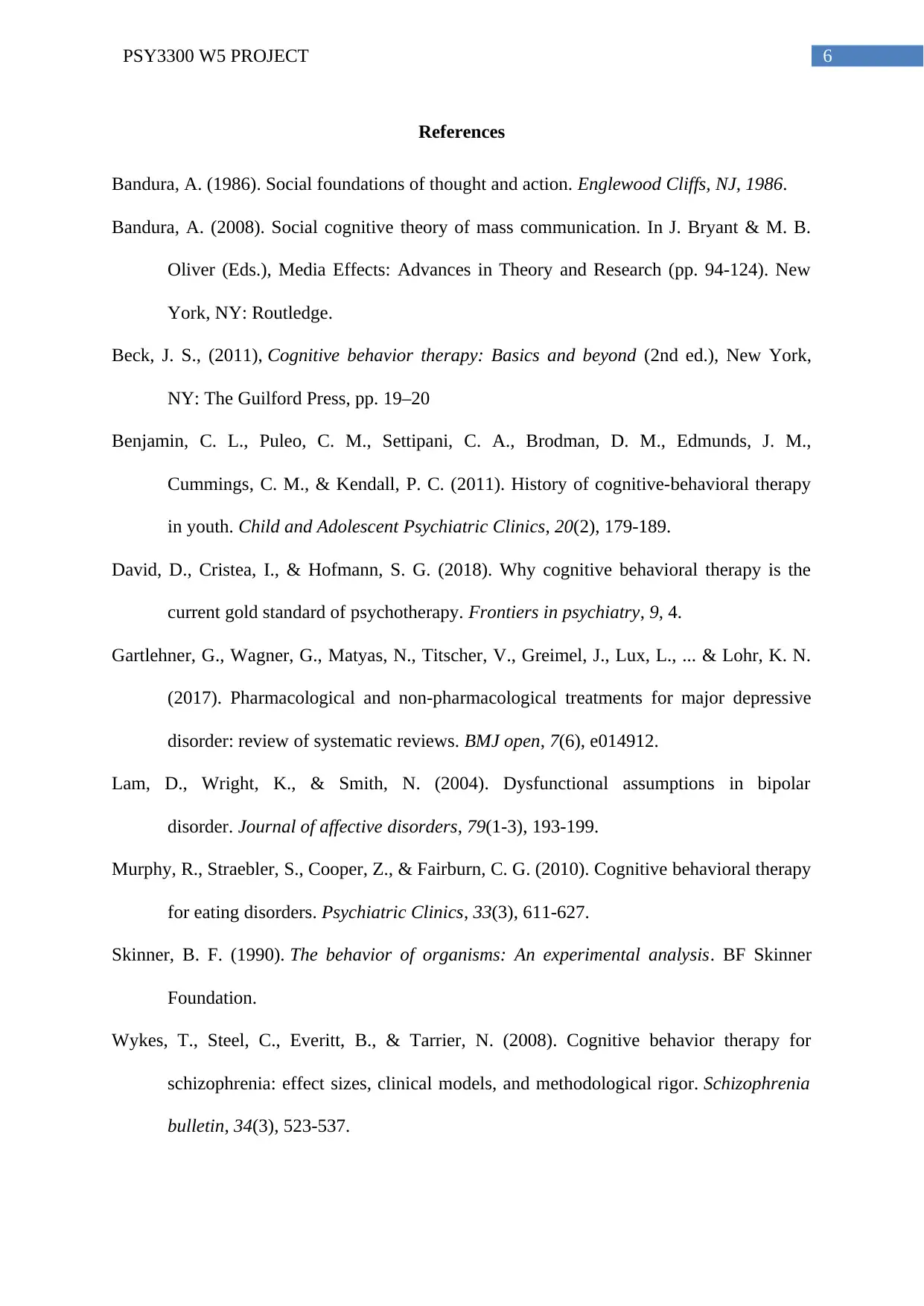
6PSY3300 W5 PROJECT
References
Bandura, A. (1986). Social foundations of thought and action. Englewood Cliffs, NJ, 1986.
Bandura, A. (2008). Social cognitive theory of mass communication. In J. Bryant & M. B.
Oliver (Eds.), Media Effects: Advances in Theory and Research (pp. 94-124). New
York, NY: Routledge.
Beck, J. S., (2011), Cognitive behavior therapy: Basics and beyond (2nd ed.), New York,
NY: The Guilford Press, pp. 19–20
Benjamin, C. L., Puleo, C. M., Settipani, C. A., Brodman, D. M., Edmunds, J. M.,
Cummings, C. M., & Kendall, P. C. (2011). History of cognitive-behavioral therapy
in youth. Child and Adolescent Psychiatric Clinics, 20(2), 179-189.
David, D., Cristea, I., & Hofmann, S. G. (2018). Why cognitive behavioral therapy is the
current gold standard of psychotherapy. Frontiers in psychiatry, 9, 4.
Gartlehner, G., Wagner, G., Matyas, N., Titscher, V., Greimel, J., Lux, L., ... & Lohr, K. N.
(2017). Pharmacological and non-pharmacological treatments for major depressive
disorder: review of systematic reviews. BMJ open, 7(6), e014912.
Lam, D., Wright, K., & Smith, N. (2004). Dysfunctional assumptions in bipolar
disorder. Journal of affective disorders, 79(1-3), 193-199.
Murphy, R., Straebler, S., Cooper, Z., & Fairburn, C. G. (2010). Cognitive behavioral therapy
for eating disorders. Psychiatric Clinics, 33(3), 611-627.
Skinner, B. F. (1990). The behavior of organisms: An experimental analysis. BF Skinner
Foundation.
Wykes, T., Steel, C., Everitt, B., & Tarrier, N. (2008). Cognitive behavior therapy for
schizophrenia: effect sizes, clinical models, and methodological rigor. Schizophrenia
bulletin, 34(3), 523-537.
References
Bandura, A. (1986). Social foundations of thought and action. Englewood Cliffs, NJ, 1986.
Bandura, A. (2008). Social cognitive theory of mass communication. In J. Bryant & M. B.
Oliver (Eds.), Media Effects: Advances in Theory and Research (pp. 94-124). New
York, NY: Routledge.
Beck, J. S., (2011), Cognitive behavior therapy: Basics and beyond (2nd ed.), New York,
NY: The Guilford Press, pp. 19–20
Benjamin, C. L., Puleo, C. M., Settipani, C. A., Brodman, D. M., Edmunds, J. M.,
Cummings, C. M., & Kendall, P. C. (2011). History of cognitive-behavioral therapy
in youth. Child and Adolescent Psychiatric Clinics, 20(2), 179-189.
David, D., Cristea, I., & Hofmann, S. G. (2018). Why cognitive behavioral therapy is the
current gold standard of psychotherapy. Frontiers in psychiatry, 9, 4.
Gartlehner, G., Wagner, G., Matyas, N., Titscher, V., Greimel, J., Lux, L., ... & Lohr, K. N.
(2017). Pharmacological and non-pharmacological treatments for major depressive
disorder: review of systematic reviews. BMJ open, 7(6), e014912.
Lam, D., Wright, K., & Smith, N. (2004). Dysfunctional assumptions in bipolar
disorder. Journal of affective disorders, 79(1-3), 193-199.
Murphy, R., Straebler, S., Cooper, Z., & Fairburn, C. G. (2010). Cognitive behavioral therapy
for eating disorders. Psychiatric Clinics, 33(3), 611-627.
Skinner, B. F. (1990). The behavior of organisms: An experimental analysis. BF Skinner
Foundation.
Wykes, T., Steel, C., Everitt, B., & Tarrier, N. (2008). Cognitive behavior therapy for
schizophrenia: effect sizes, clinical models, and methodological rigor. Schizophrenia
bulletin, 34(3), 523-537.
Paraphrase This Document
Need a fresh take? Get an instant paraphrase of this document with our AI Paraphraser

7PSY3300 W5 PROJECT
1 out of 8
Your All-in-One AI-Powered Toolkit for Academic Success.
+13062052269
info@desklib.com
Available 24*7 on WhatsApp / Email
![[object Object]](/_next/static/media/star-bottom.7253800d.svg)
Unlock your academic potential
© 2024 | Zucol Services PVT LTD | All rights reserved.
